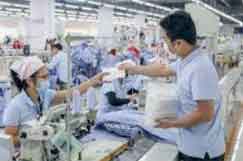The coronavirus pandemic has been has very good for companies in sectors such as cleaning products and many food items, but very tough on many others, such as apparel companies and retailers.
Esquel Group, one of the world's largest shirt makers, had already been on a journey to meet increasing customer requirements for a broad range of product to be delivered in shorter lead times.
Supply Chain Digest Says... |
 |
| Tuft says that the combination of these two approaches has re-engineered the production process across Esquel's entire Guilin factory, maximizing its operational efficiency. |
 |
What do you say? |
| Click here to send us your comments |
 |
| Click here to see reader feedback |
|
|
According to a guest column by Edgar Tung, Managing Director of Global Operations at Esquel Group, published on the World Economic Forum's website this week, the company has been experimenting with and implementing Lean and agile operational concepts for many years. But it now says a key factor in the success of ESS' flagship factory in Guilin, China, is what the company calls its "'mangineer" program.
What is a "magnineer?"
According to Esquel, the mangineer concept combines the traditional roles of a manager and an operations engineer. The result is a new pool of trained professionals who wear a number of hats.
"They are capable not just of overseeing routine machine operations, but can also supervise quality control, ensuring production safety, and - above all provide on-site, cross-functional project management," the Tung says.
At the foundation of the mangineer program are two principles: decentralized management and centralized control.
1. Decentralized management empowers each mangineer with responsibility for all aspects of production in his or her designated zone within the factory, including planning, machinery operation, quality assurance and resolving technical issues.
Tung says that every mangineer is equipped with the skillset and authority to manage all scenarios without supervision. He adds that compared to the traditional model, decentralized management greatly cuts down the time and labor needed for each task, saves manufacturing costs, and increases productivity.
For example, Tung says that to change a machine setting, the traditional process involved 10 steps and requires coordination among different departments, which takes an average of 59 minutes. With mangineers taking up the task, there is no need to coordinate between departments; the process can instead be boiled down to four steps and completed within 25 minutes.
2. The centralized control system of the factory, if it detects any problems in the automated production process, will dispatch on-site mangineers to the location where a problem occurred, based on the mangineer's skills and workload and the urgency of the problem. This combines process automation with the flexibility of human intervention. The agile system manages an optimal balance between staff capacity and efficient troubleshooting.
(Article Continued Below)
|
CATEGORY SPONSOR: SOFTEON |
|
|
| |
|
|
Mangineers are subsequently assessed based on comprehensive key performance indicators (KPIs) that take into account labor intensity and employee happiness. If this was to be done traditionally, tasks would have to be assessed and assigned manually to different departments, and precious time would be wasted on cross-functional communication and approvals.
Tuft says that the combination of these two approaches has re-engineered the production process across Esquel's entire Guilin factory, maximizing its operational efficiency.
 Tung writes that in 2015, Esquel recruited more than 150 college graduates into the program, the majority of whom came from engineering backgrounds. Tung writes that in 2015, Esquel recruited more than 150 college graduates into the program, the majority of whom came from engineering backgrounds.
The new recruits went on to have one year of basic skills training, and then underwent a simulation workshop to acquire hands-on experience of different production scenarios. Their engineering skills were put to the test when they handled the setup of all newly imported machines before production began at the factory in 2018.
Top-performing mangineers were rewarded with exchange programs at other Esquel factories and more managerial responsibilities.
"We believe the mangineer concept could be a cornerstone for the future of apparel manufacturing," Tung says.
The results tell the tale: A few years into the mangineer program, output per person at Equel in Guilin has increased by 329%. The headcount per 10,000 spindles of yarn produced been reduced by 74% from 146 to 38, which is well above the industry benchmark.
"We believe the mangineer concept could be a cornerstone for the future of apparel manufacturing," Tung concludes.
What do you think of the mangineer concept? Let us know your thoughts at the Feedback section below
Your Comments/Feedback
|